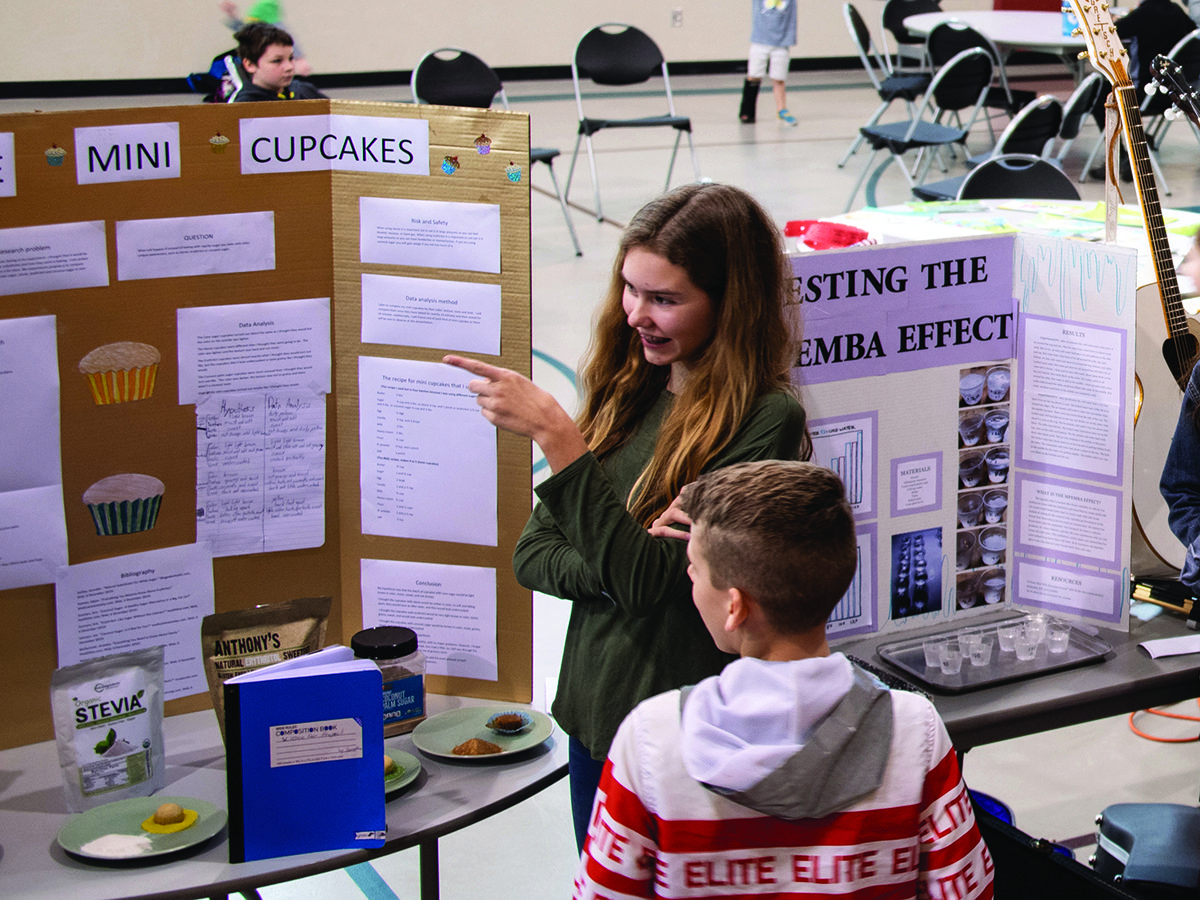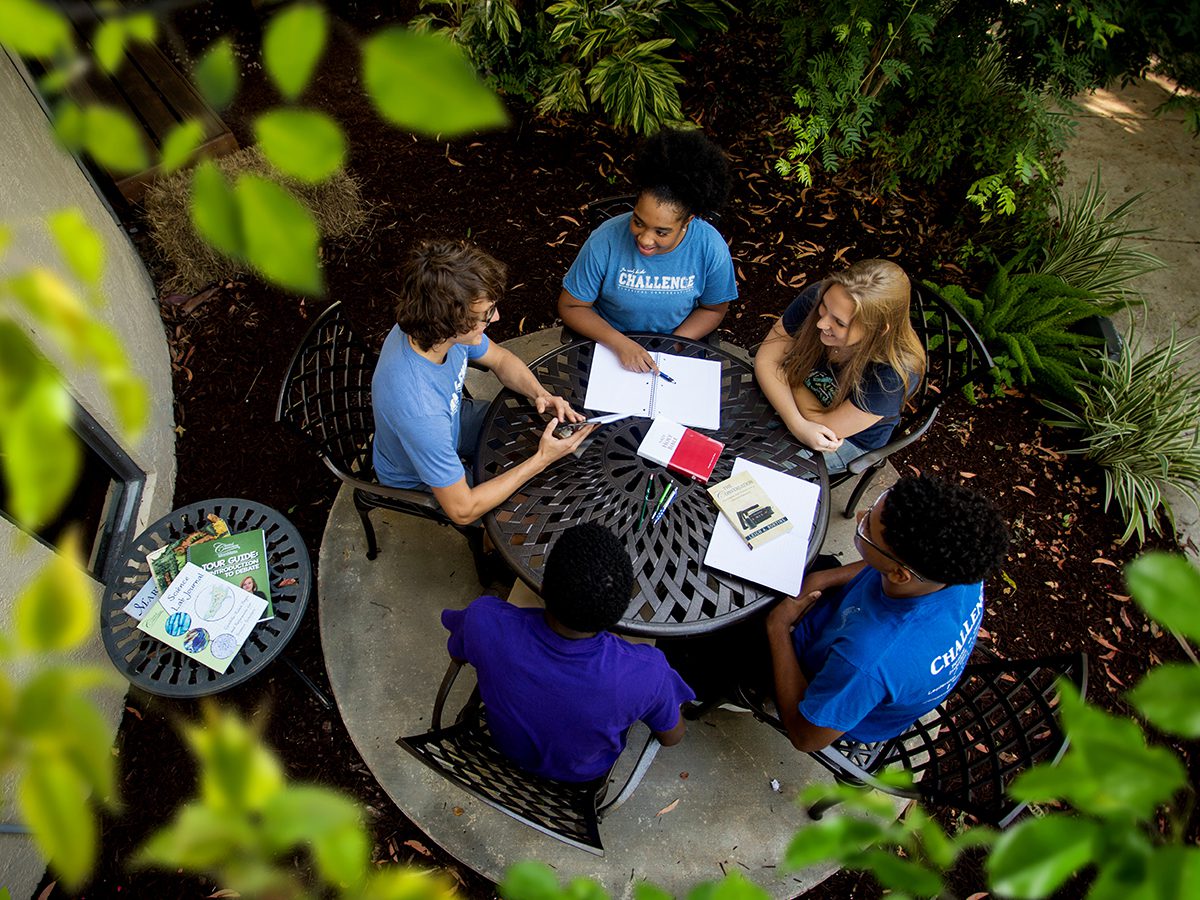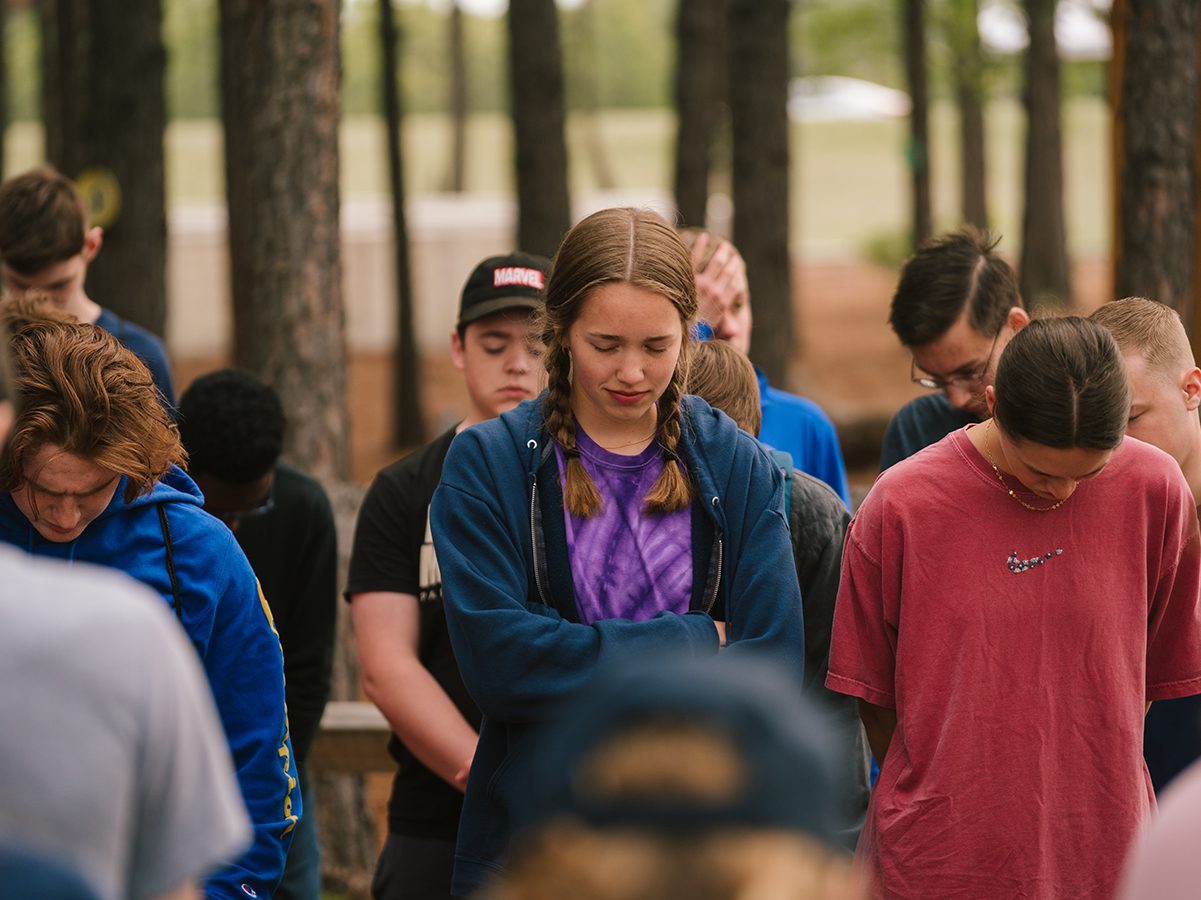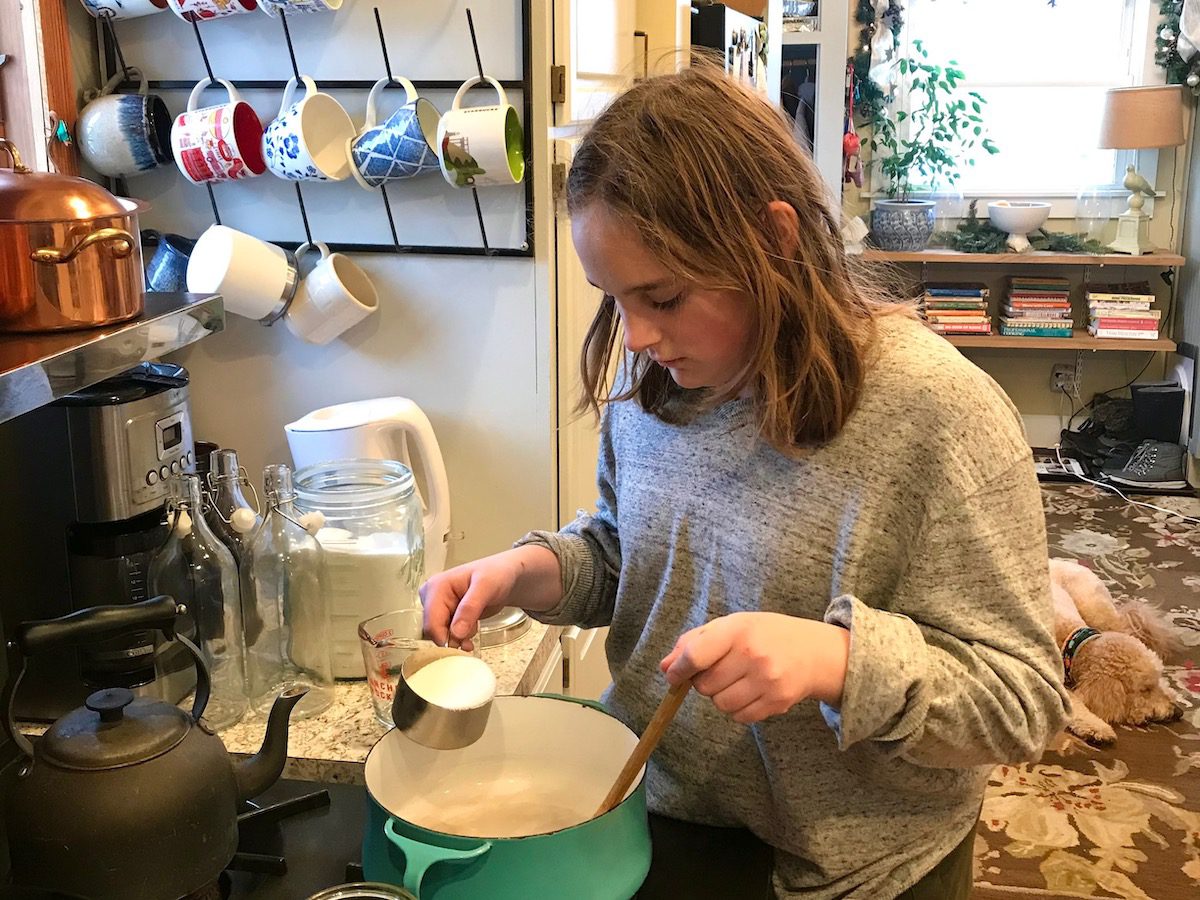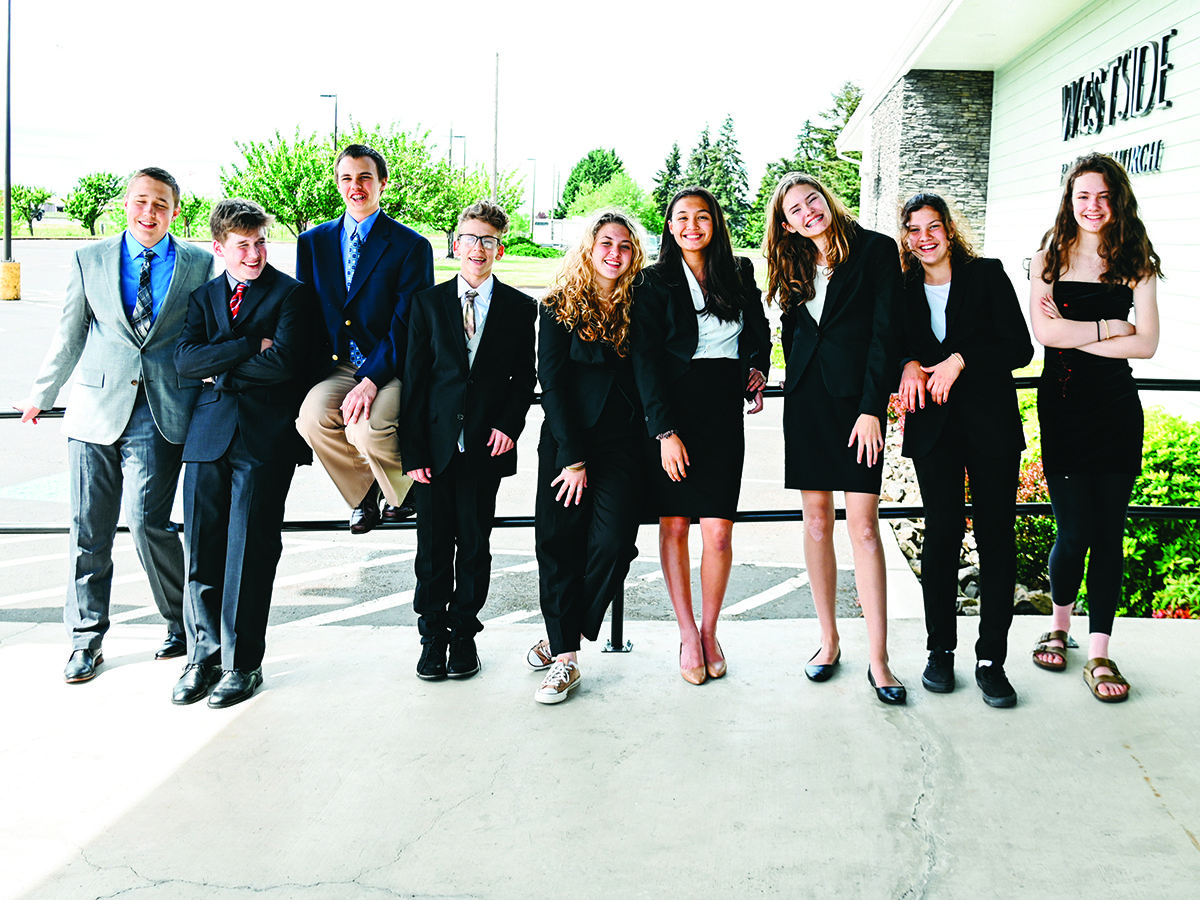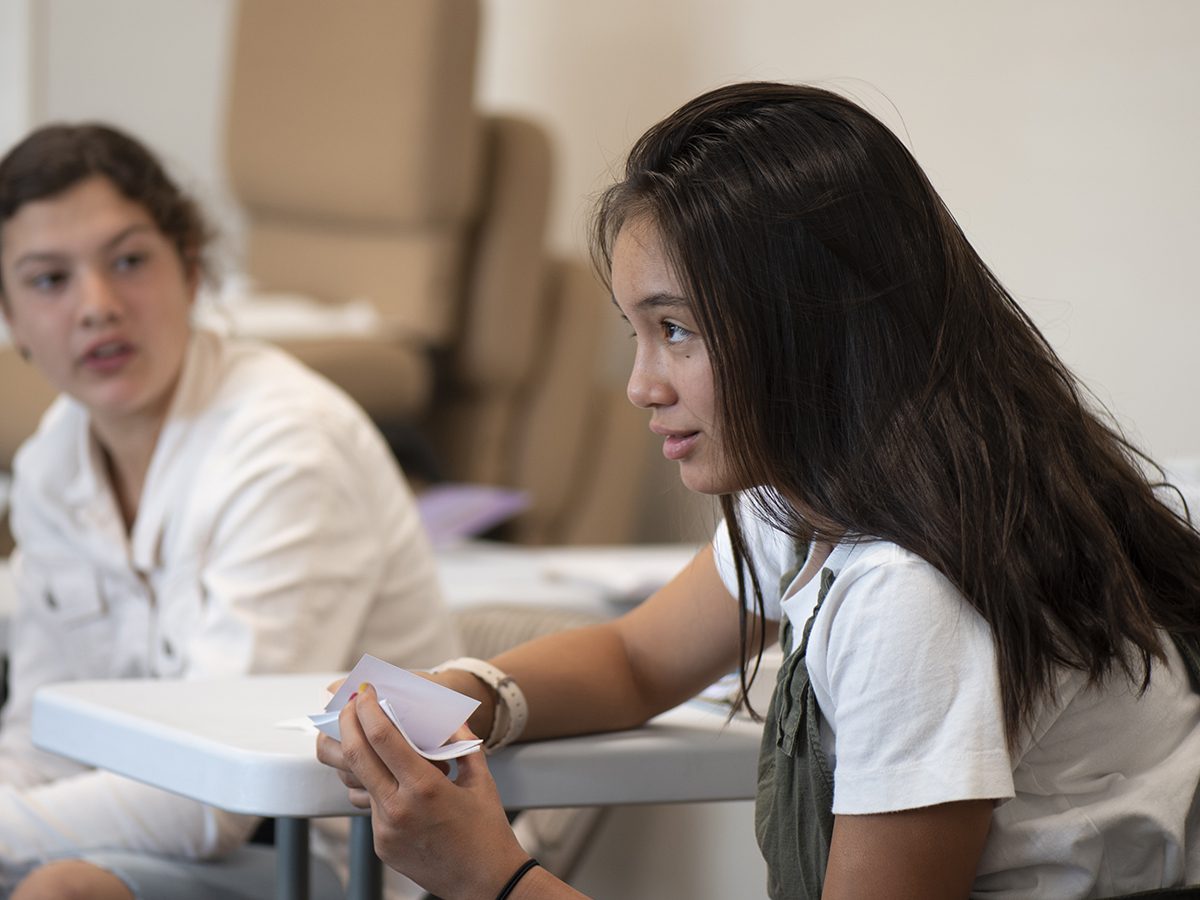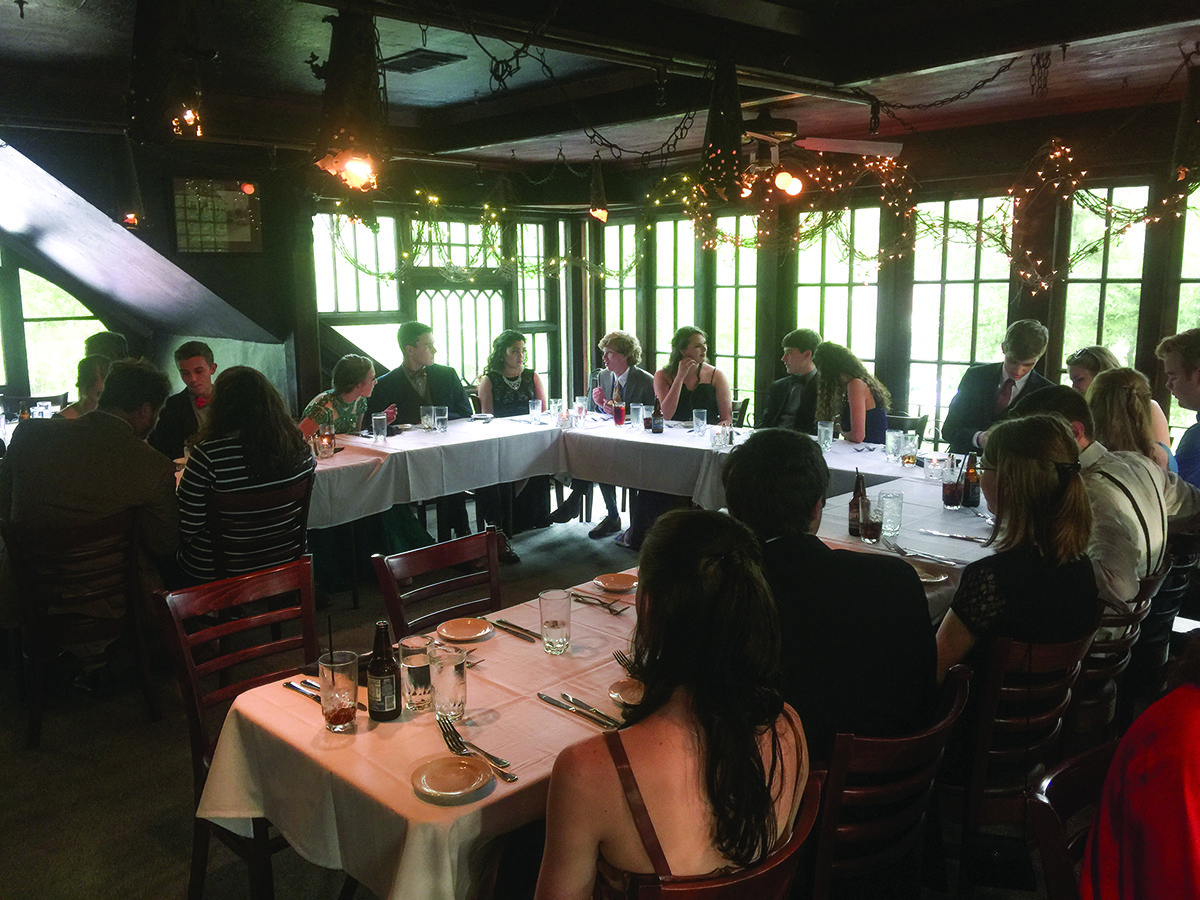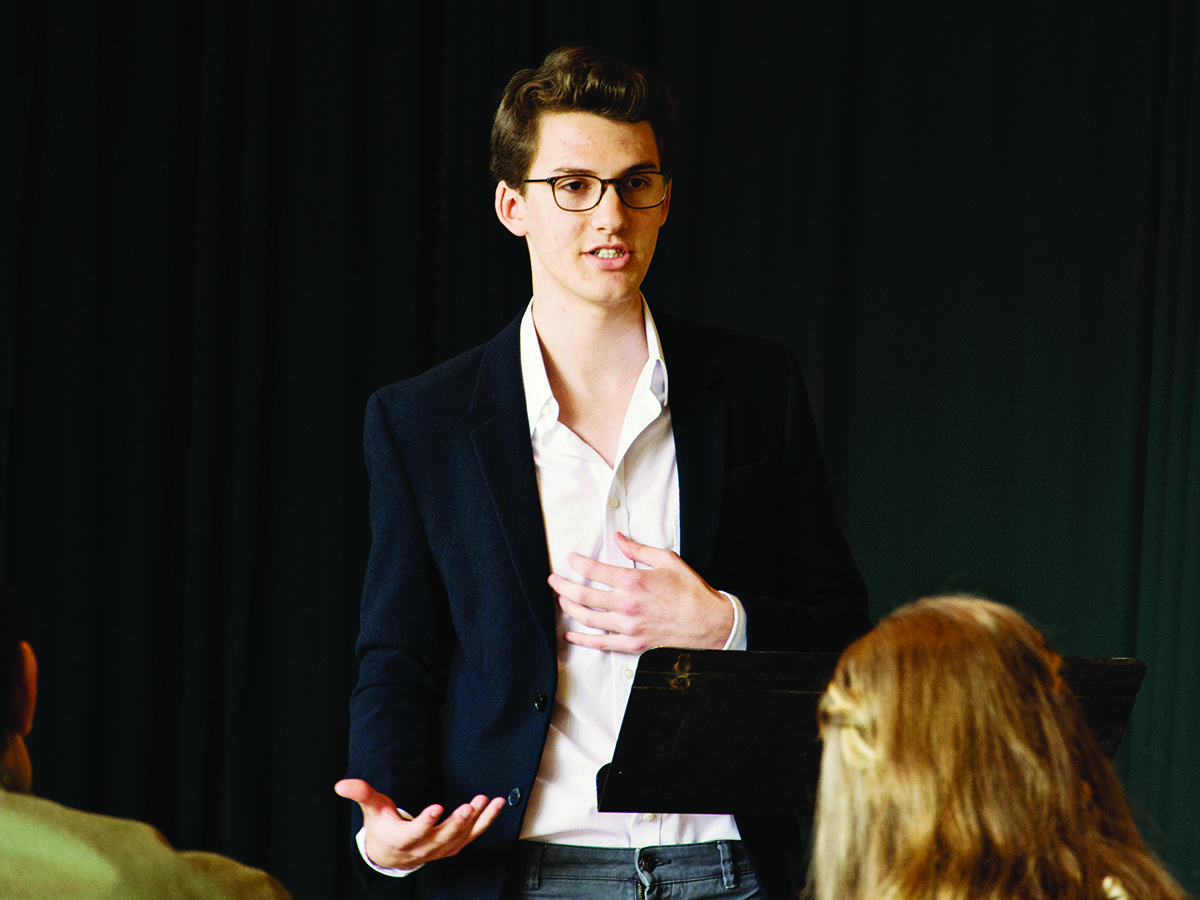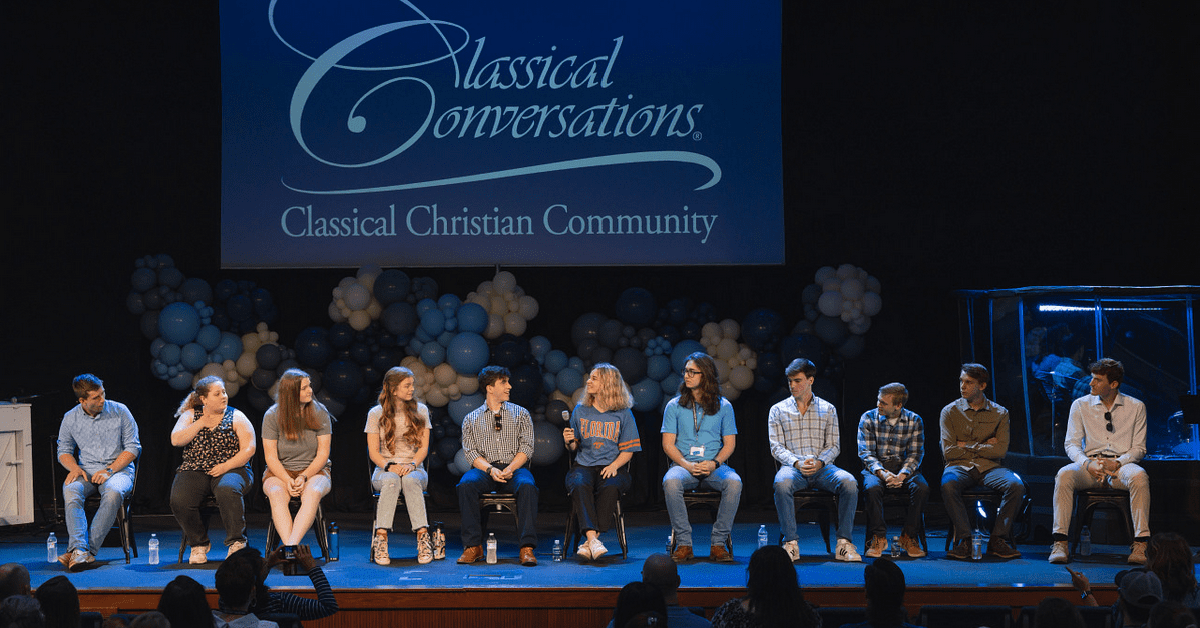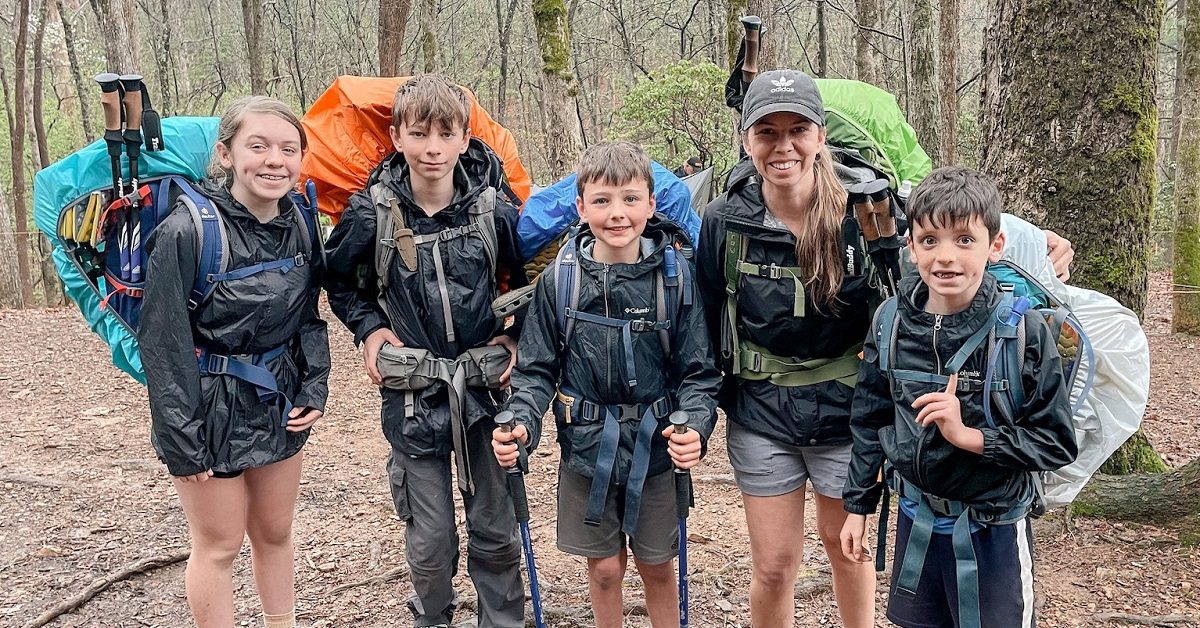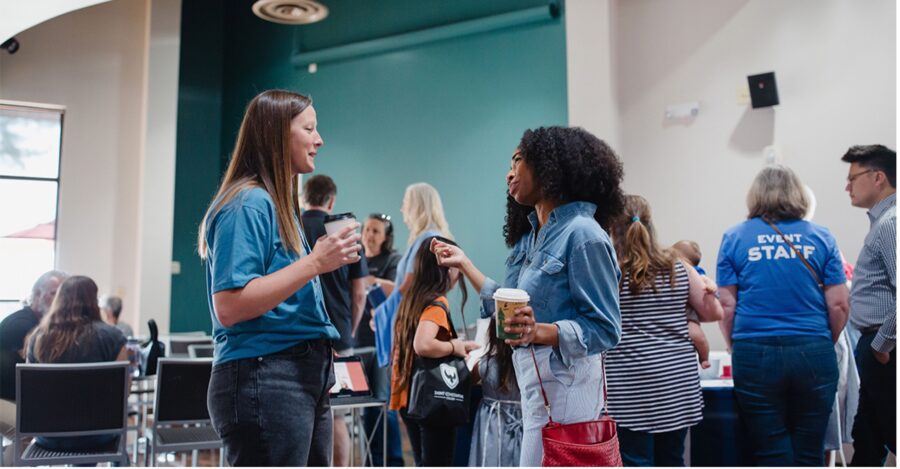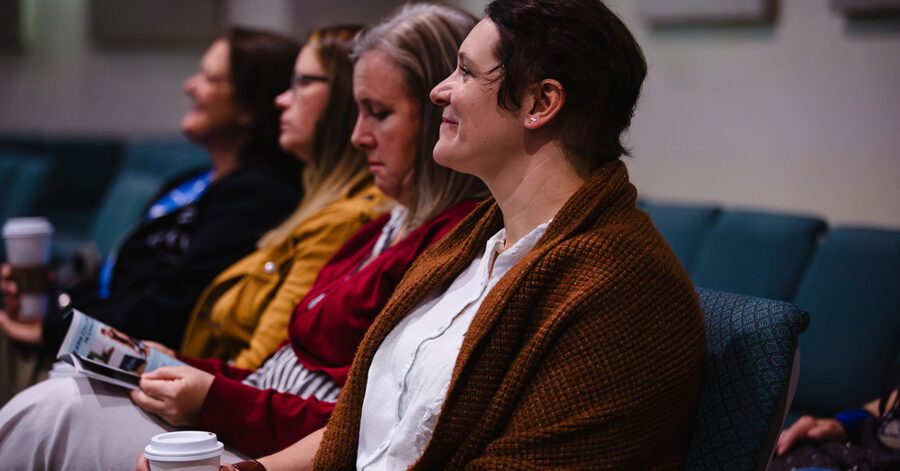Are you intrigued by the idea of a rigorous, classical, Christ-centered, and community-based homeschool program for your high school student? Classical Conversations has got you covered! This page serves as your one-stop resource for information, insights, and inspiration to guide you through every step of the Challenge program, our high school homeschool program. You might want to bookmark this one!
Find a Challenge Community Near You
I. The Challenge Program
The Challenge program is rooted in the classical, Christian model of education. What does that mean?
Our worldview is Christ-centered. All knowledge begins with God. God, who is one in perfect unity, created a knowable and indivisible universe that is best explored through connections rather than discrete—and soon forgotten—units of study. That means the best model of education is one that teaches us how to learn and equips us with the skills of learning.
We’ve developed the Challenge high school homeschool curriculum around this understanding for the purpose of glorifying God, and the time students spend in community reinforces the skills of learning with hands-on practice. Directors, meanwhile, guide students through the practice of skills from knowledge to wisdom.
That’s Challenge in a nutshell.
II. Challenge Program Levels
The following resources cover individual Challenge levels (you can also click on the pictures to go to the articles):
Challenge A
Theme: Attention Leads to Ownership
The first of the Challenge programs, Challenge A is intended for students age twelve and up and corresponds with the 7th grade in the traditional school system. Students will practice their skills that they will continue to develop throughout the Challenge years, taking courses in Newbery Literature, Latin A, Natural Science and Anatomy, Cartography, Analogies and Reasoning, and Arithmetic. Students finish the year with the exciting signature event of the science fair.
Challenge B
Theme: Ownership Builds Discipline
Challenge B builds upon Challenge A. Corresponding with 8th grade, Challenge B applies the skills honed in Challenge A to new areas of inquiry while deepening their knowledge through courses in Newbery Literature and Short Stories, Latin B, History of Astronomy and Origins, American Biographies and Origins, Informal and Formal Logic, and Pre-Algebra. Students will hold a thrilling mock trial at this level.
Challenge I
Theme: Discipline Is the Cornerstone of Freedom
After Challenge B, students ages fourteen and up will make the leap to Challenge I, which corresponds with 9th grade. Here, students will begin to consider what they ought rather than what they want, which means exploring the lives of great characters and taking on new and challenging projects. They will take courses in American Literature, Latin 1, Physical Science, American Government and Economics, Traditional Logic and Drama, and Algebra. Students will practice debate at this level.
Challenge II
Theme: Freedom Provides Opportunities for Noble Choices
Throughout Challenge II, students will begin to analyze choices—their own and the choices of others. They’ll also expand their horizons, moving from American history and literature to British literature and Western Cultural History. They will take courses in Latin 2, Traditional Logic 2 and Socratic Dialogue, and Algebra. This year also presents a fun and unique event in the form of Protocol, where students will have the chance to practice etiquette!
Challenge III
Theme: All Choices Bring Consequences
Intended for students ages sixteen and up, Challenge III explores the consequences of decisions and marks the transition from knowledge to understanding. Students will explore the good, the true, and the beautiful at a deeper level, engaging in the whys and wherefores of philosophy and literature and sharpening their rhetoric in Latin. They will take courses in Poetry and Shakespeare, Caesar and Cicero Translations, Chemistry, American History, Music Theory and Philosophy, and Precalculus A. Poetry café is a fun, optional, end-of-year event for Challenge III families.
Challenge IV
Theme: Understanding Consequences Defines Leadership
Challenge IV. The last year of the Challenge program. The bridge to adulthood. This year is special, focusing on the movement from understanding to wisdom. Students will study Scripture and theology, consider the grand story of world history, and apply their logic to truly abstract concepts. Accordingly, they will take courses in Ancient Literature, Virgil and Various Translations, Physics, World History, Theology, and Precalculus B. Students will write their Senior Theses this year, and they will want to explore other unique opportunities, as well. (We’ll cover those in Section IV of this post.)
III. Challenge Program Capstones
In the previous section, we mentioned some of the exciting end-of-year projects students will conduct. The following resources explore these events in greater detail:
Challenge A: Science Fair
Your Guide to a Successful Homeschool Science Fair
. . . wait, are there really homeschool science fairs? Yes, really! You can conduct your own science fair either at home or in community. A homeschool science fair is a launchpad for scientific exploration, not just another checkbox on the academic list. Dive into practical tips and encouraging stories, guiding you through the process with clarity and support. No matter your science background, discover how to nurture your child’s curiosity, cultivate critical thinking skills, and transform the science fair into a rewarding learning experience.
Challenge B: Mock Trial
I Survived Mock Trial
Tongue-in-cheek blog title aside, Mock Trial is great fun! In this blog post, you’ll discover tips for sparking your student’s interest, fostering critical thinking, and nurturing a love for the law. Watch your student develop a deeper understanding of the justice system—all thanks to your support!
Challenge I: Debate
14 Benefits of a Homeschool Debate Curriculum
Debate: not just about winning arguments. This post discusses the transformative potential of debate and showcases how debate cultivates a diverse skillset. From analyzing viewpoints (the “dialectic stage,” in the parlance of classical education) to speaking with confidence (the “rhetoric stage”), debate equips your student for success.
Challenge II: Protocol
Is Protocol “Starched, Stuffy, and Stiff?”
Don’t let the word “protocol” evoke stuffy images of high tea and starched napkins! Protocol is a tool, not a burden. Protocol fosters grace, respect, and a sense of community – both within the Challenge program and beyond. Learn how these formal rituals cultivate confidence and social intelligence, empowering kids (even introverts!) to thrive in various social settings.
Challenge III: Poetry Café
Host a Poetry Café in Your Local Community!
Attention creative minds and budding wordsmiths. Poetry Café isn’t just a dusty ol’ book club. This event ignites a passion for language and turns shy whispers into confident verses. Dive into a supportive community where original poems find their voice and where students unlock their self-expression, hone their delivery skills, and admire the beauty of language.
Challenge IV: Senior Thesis
Why the Senior Thesis?
Forget the looming dread of a final exam. Classical Conversations presents the Senior Thesis as the culmination of your student’s intellectual journey and not just an academic hurdle. This blog post paints a picture of why this project matters—and this post also guides you through every step with empathy and practical advice.
IV. Challenge Program Opportunities
The Challenge years are preparation for life as a grown-up. As the parent of a teenager, you’ll step back and take on the role of mentor while preparing your student for what comes next.
These blog posts will help you find your footing among all the options offered by Classical Conversations:
Getting Ready for College
Assessment Options
Okay, so this one isn’t a blog post, but you’ll definitely want to bookmark the assessment options page for the membership deals and quick links to testing centers near you.
Why Homeschoolers Should Take Standardized Tests
Is standardized testing the right fit for your homeschooler? Many homeschooling parents worry that standardized tests aren’t a good fit for their student’s unique education. But did you know that standardized tests can offer valuable benefits for homeschoolers? In this blog post, we’ll explore how standardized testing can provide feedback on your student’s progress, help them prepare for college, and even offer relief from the stress of homeschooling. (Testing? Relief? What?! But it’s true.) We’ll also discuss the different types of standardized tests available and how to choose the right one for your student.
Earning College Credits in Challenge
CC Plus: College Credits for Homeschoolers
Homeschool credit meets college savings! Learn about CC Plus, a program that offers college credit for homeschoolers in partnership with Southeastern University. Students can earn dual enrollment credit while in high school and undergraduate degrees online. Parents can also earn a master’s degree by homeschooling their child through the Challenge program. Credits are regionally accredited and transferable.
Earn College Credits for Homeschool Coursework
Discover how Ella St. Laurent earned college credit while completing homeschool coursework. In this inspiring post, you’ll learn how CC Plus helped a real Challenge graduate meet her goals. Read Ella’s story and see how CC Plus can open doors for your family.
Getting Ready for Graduation
7 Reasons Why You Should Attend the Classical Conversations National Commencement
Just because you’re homeschooling doesn’t mean you have to miss out on a graduation ceremony. National Commencement is your chance to celebrate your graduate with other homeschoolers. Don’t miss this opportunity to learn, grow, and be inspired!
6 Tips for Planning a Successful Homeschool Graduation
If you can’t make National Commencement, or if you’d like to hold a second local graduation ceremony, you’ll want to check out this resource and make your homeschooler’s graduation ceremony a cherished memory with these expert planning tips. From setting expectations to creating a meaningful program, we’ll guide you through every step. Ensure your graduate feels celebrated and prepared for the next chapter with this practical advice and heartfelt inspiration. Plus, download a helpful infographic!
V. Advice for the Challenge Program
Looking for advice on how to get your family ready for Challenge, or interested in getting the most out of the program? These resources will help you!
Getting Ready for Challenge
Laying the Foundations for the Challenge Program
The Challenge program begins with Foundations! In this resource, you’ll discover how you can prepare for the Challenge programs by building a strong academic foundation that fosters critical thinking, communication, and a love of learning. Our unique approach equips students with the core habits of grammar and a solid knowledge base. Set your child on the path to success with Foundations.
Help! I’m Starting Challenge I without Foundations!
While it’s true that the Challenge program is built upon the Foundations program, it’s never too late to start homeschooling. You can still embark on the Challenge journey with confidence, even if you’re new to Classical Conversations. Discover how this comprehensive program, designed for beginners, lays a solid foundation in Latin, literature, history, and critical thinking skills.
Don’t let inexperience hold you back—join the Challenge I community and empower your student’s academic future.
Help! I’m Starting Challenge II without Foundations or Challenge!
Read this homeschool graduate’s inspiring story of overcoming self-doubt and achieving success in Challenge II, despite having no prior experience. Her journey is a testament to the power of hard work, perseverance, and the support of her community. If you’re considering Challenge II, be inspired by Cassidy’s courage!
Getting the Most out of Challenge
Helpful Tips for New Challenge Families
New to Challenge? Welcome! We’re here to guide you on your enriching homeschooling journey. Discover the core values of the Challenge program, and equip yourself with these three essential tips: define your family’s learning goals, explore available resources, and cultivate a love of learning together. Build lasting relationships with Classical Conversations.
How the Challenge Program Challenged Me
In this blog post, a Classical Conversations graduate shares her experience in Challenge. Read about she went beyond the academics, and explore the program’s emphasis on Christian values and character development. Discover how Challenge fostered critical thinking, communication, and a deeper understanding of faith. Are you ready to be challenged to grow in mind, body, and spirit?
Homeschool Art and Beauty in the Challenge Years
Discover how you can tap into your student’s creativity and explore the beauty of art within Challenge. Learn how to seamlessly integrate art into your homeschool curriculum with our practical tips and suggestions. From weekly “Sketchbook Breaks” to engaging art projects for each Challenge level, discover the joy and power of artistic expression in your homeschooling journey.
Want to Learn More about Homeschooling through High School?
Attend a Window into Challenge event!
Many parents feel the high school years are when the benefits of homeschool really came to life. Window into Challenge is your introduction to the Classical Conversations Challenge program, designed to equip your student for college and for life. You’ll discover the structure, material, and benefits of Challenge and get a chance to talk with parents already in the program.
Don’t miss out on this opportunity to discover how the Challenge program can help your student thrive through graduation. Find an event near you!
Find a Window into Challenge Event Near You
Are You Challenge-Ready?
The Challenge program offers a Christ-centered and community-focused education that goes beyond mere academics and enables you to cultivate a young critical thinker, confident communicator, and young leader prepared to make a difference in the world.
Remember:
The Challenge program is built upon a strong foundation, but even if you’re new to homeschooling, there’s a place for you! Resources are available to guide you every step of the way.
These programs are more than just academics—they’re ultimately about knowing God and making Him known and fostering intellectual curiosity, character development, and a love of learning that will last a lifetime.
So, explore the resources provided in this guide, connect with your local CC community, and discover how Challenge can empower your student to thrive in every aspect of life.


